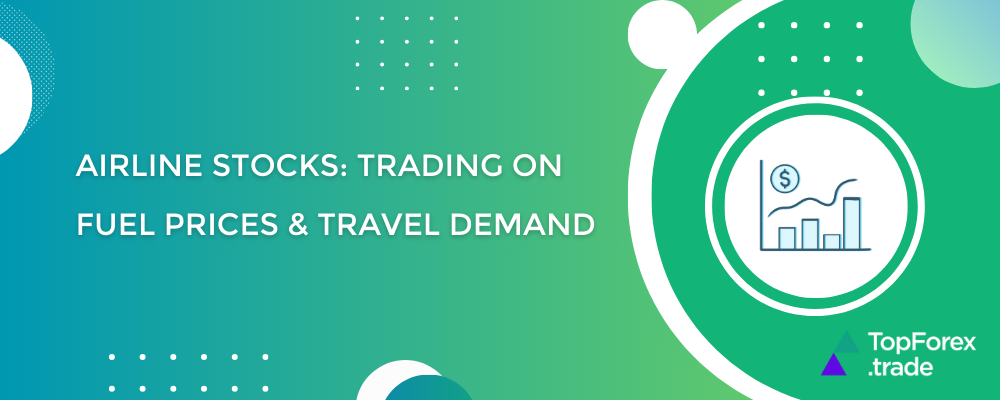Trading airline stocks: how fuel costs and travel trends affect prices

The airline industry is a dynamic and highly cyclical sector, making airline stocks particularly sensitive to external factors such as fuel prices, travel demand, and macroeconomic conditions. Understanding these key drivers can provide valuable insights into potential price movements for traders and investors. In this article, we’ll explore how fuel costs and travel trends impact airline stocks and what strategies traders can use to capitalize on these fluctuations.
The impact of fuel prices on airline stocks

Jet fuel is one of the largest operating expenses for airlines, often accounting for 20-30% of total costs. As a result, fluctuations in oil prices can have a direct and significant impact on airline profitability.
➡ How rising fuel prices affect airlines
- Higher operational costs: When oil prices surge, airlines face increased fuel expenses, squeezing profit margins.
- Potential fare hikes: To offset costs, airlines may raise ticket prices, but this can reduce demand if prices become too high.
- Earnings volatility: Airlines with poor fuel hedging strategies may see sharp declines in earnings during oil price spikes.
➡ How falling fuel prices benefit airlines
- Improved profitability: Lower fuel costs boost margins, leading to stronger earnings reports.
- Increased competitiveness: Airlines may lower fares to attract more passengers, stimulating demand.
- Better investor sentiment: Stocks often rally when fuel expenses decline, especially for carriers with high fuel consumption.
➡ Trading strategy: monitoring oil markets
- Watch crude oil futures (WTI and Brent) as leading indicators for jet fuel prices.
- Track airline fuel hedging policies – some airlines lock in fuel prices in advance, reducing volatility.
- Consider shorting airline stocks when oil prices surge unexpectedly or going long when oil prices drop significantly.
Travel trends and their influence on airline stocks

Beyond fuel costs, airline stocks are heavily influenced by passenger demand, which is driven by economic conditions, consumer confidence, and global travel trends.
➡ Key travel trends affecting airlines
- Leisure travel (leisure + business): The post-pandemic shift towards blended travel (remote work combined with vacations) has increased demand for flexible bookings.
- International travel recovery: Airlines with strong international routes benefit as long-haul travel rebounds.
- Seasonal demand: Holiday seasons and summer travel spikes can lead to revenue surges.
- Economic health: During recessions, consumers cut back on discretionary spending, reducing air travel demand.
➡ Trading strategy: analyzing travel data
- Monitor TSA passenger numbers (released weekly) for real-time demand insights.
- Watch airline earnings reports for guidance on future bookings.
- Track consumer sentiment indices (e.g., University of Michigan Index) to gauge spending trends.
Other factors influencing airline stocks
- Interest rates: Airlines carry high debt loads; rising rates increase borrowing costs.
- Labor costs: Pilot shortages and union negotiations can impact profitability.
- Geopolitical risks: Wars, pandemics, or airspace restrictions disrupt operations.
Popular airline stocks to watch
Here are some of the most traded airline stocks in the market:
| Airline stock | Ticker | Key features |
|---|---|---|
| Delta Air Lines | DAL (NYSE) | Strong U.S. domestic and international presence |
| American Airlines | AAL (NASDAQ) | High debt but benefits from travel rebounds |
| United Airlines | UAL (NASDAQ) | Focus on premium travel and international expansion |
| Southwest Airlines | LUV (NYSE) | Low-cost leader, strong U.S. market share |
| Lufthansa | LHA (ETR) | Major European carrier, exposure to transatlantic flights |
| Ryanair | RYA (ISE) | Europe’s largest low-cost airline |
| Air France-KLM | AF (EPA) | Strong in European and long-haul travel |
| Qantas Airways | QAN (ASX) | Australia’s flagship airline |
Trading example: how to trade airline stocks

Scenario: oil prices drop, boosting airline profits
- Market observation: Crude oil prices fall by 10% due to increased supply.
- Stock selection: Delta Air Lines (DAL) has strong earnings potential and lower fuel costs.
- Entry point: DAL is trading at 40, with support at 38.
- Trade execution:
- Buy DAL at $40
- Stop-loss at $37 (risk management)
- Take-profit at $45 (based on resistance levels)
- Outcome: If oil remains low and travel demand stays strong, DAL could rise to $45, yielding a 12.5% return.
Top 5 Forex brokers to trade airline stocks
If you’re looking to trade airline stocks, here are five recommended brokers:
🧩 Note: Each broker has strengths – choose based on platform, spreads, leverage, and education tools.
🎯 Pro tip: Use demo accounts to test oil strategies risk-free before committing capital.
XTB
- Regulation: FCA, CySEC, KNF
- Platforms: xStation 5 (proprietary), MT4
- Features: Commission-free stock trading (in select regions), competitive spreads, advanced charting tools
- Asset coverage: Stocks, ETFs, Forex, commodities, indices
eToro
- Regulation: FCA, CySEC, ASIC
- Platforms: Web-based, mobile app
- Features: Social trading, copy trading, low-cost stock trading
- Asset coverage: Stocks, ETFs, Cryptocurrencies, commodities
Risk disclaimer: eToro is a multi-asset platform which offers both investing in stocks and cryptoassets, as well as trading CFDs.
CFDs are complex instruments and come with a high risk of losing money rapidly due to leverage. 51% of retail investor accounts lose money when trading CFDs with this provider. You should consider whether you understand how CFDs work, and whether you can afford to take the high risk of losing your money.
This communication is intended for information and educational purposes only and should not be considered investment advice or investment recommendation. Past performance is not an indication of future results.
Copy Trading does not amount to investment advice. The value of your investments may go up or down. Your capital is at risk.
Don’t invest unless you’re prepared to lose all the money you invest. This is a high-risk investment and you should not expect to be protected if something goes wrong. Take 2 mins to learn more.
eToro USA LLC does not offer CFDs and makes no representation and assumes no liability as to the accuracy or completeness of the content of this publication, which has been prepared by our partner utilizing publicly available non-entity specific information about eToro.
AvaTrade
- Regulation: Central Bank of Ireland, ASIC, FSCA
- Platforms: MT4, MT5, AvaTradeGO
- Features: Automated trading, hedging allowed, educational resources
- Asset coverage: Stocks, Forex, options, bonds
BlackBull Markets
- Regulation: FMA (New Zealand), FSA (Seychelles)
- Platforms: MT4, MT5
- Features: ECN trading environment, tight spreads, fast execution
- Asset сoverage: Forex, stocks, commodities, indices
Plus500
- Regulation: FCA, CySEC, ASIC
- Platforms: WebTrader, mobile app
- Features: User-friendly interface, risk management tools
- Asset сoverage: CFDs on ыtocks, ETFs, Forex, сommodities
82% of retail investor accounts lose money when trading CFDs with this provider. You should consider whether you can afford to take the high risk of losing your money.
Related articles:
Trading airline stocks - FAQ